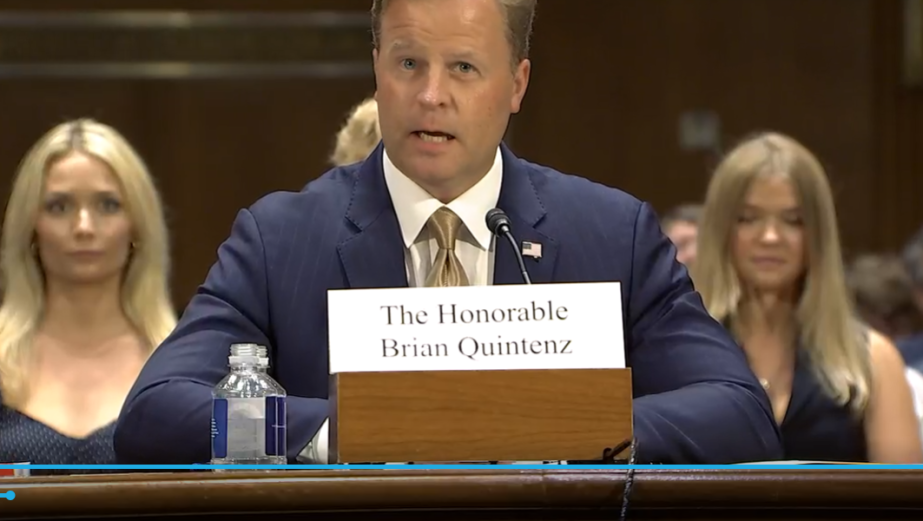The Senate Committee on Agriculture, Nutrition, and Forestry shelved its vote on the nomination of Brian Quintenz as chair of the Commodity Futures Trading Commission (CFTC) at the last minute, reportedly due to one senator being unable to vote because of a flight delay.
The committee was expected to vote on his nomination Monday. However, Quintenz’s name was dropped from the schedule just before the meeting was set to begin. A staffer confirmed to InGame that the committee would not be voting on his nomination during this meeting.
Separately, a spokesperson for the Republican majority side of the committee told InGame that the change was due to voting numbers. With all Democrats on the committee set to vote against Quintenz’s nomination, the full cohort of Republican members would be needed to ensure his nomination could be advanced, and the vote was rescheduled when it became clear that not all Republican committee members would be present.
“We will need all 12 Republicans to be present to advance the nomination because it became clear it will be a party-line vote,” the spokesperson said.
According to Bloomberg reporter Yash Roy, the change was due to a delayed flight for Cindy Hyde-Smith, a Republican senator from Mississippi.
Quintenz was nominated for the role leading the commodities regulator in February. In the position, he could shape the regulator’s stance on sports event contracts, which have been controversial as many states and tribes have argued they are an unlicensed form of sports betting.
Spokespeople for committee chair John Boozman and ranking member Amy Klobuchar did not immediately respond to requests for comment.
Letter opposed Quintenz nomination
Quintenz appears to have a permissive stance toward sports event contracts and prediction markets more generally. When asked by members of the committee about tribal concerns around exchanges offering sports event contracts during last month’s hearing, he responded by arguing that Native American tribes are free to get CFTC approval and offer their own versions of these markets.
The nominee also suggested that — in the event that a court prohibits a CFTC-registered exchange like Kalshi from offering sports event contracts — the regulator would consider appealing the ruling.
The delay comes as groups related to both the commercial and tribal gaming sectors came together to call on senators to oppose Quintenz’s nomination.
A letter obtained by InGame, signed by organizations including the American Gaming Association, Indian Gaming Association, National Council for Problem Gambling, and National Congress of American Indians, as well as 24 state or tribal organizations, urged the committee not to advance Quintenz’s nomination “until he has committed to initiate a CFTC review” of sports event contracts. The letter was addressed to Boozman and Klobuchar.
“The lack of action by the CFTC means prediction platforms will continue to offer these sports contracts without the important regulatory guardrails provided by state and tribal regulated sports betting,” the letter reads. “Instead of using his confirmation hearing to provide clarity on this issue, Mr. Quintenz implied that if he is confirmed, the CFTC will continue to do nothing to address gaming contracts. It should be deeply troubling to this Committee that he offered no assurances that the CFTC under his leadership would enforce its own regulations.
“This is even more concerning based on the fact that Mr. Quintenz is poised to not only become the CFTC Chair but could also be the sole commissioner based on current vacancies and planned departures.”
Other organizations related to the crypto sector — which Quintenz is seen as friendly toward — issued letters or statements supporting Quintenz’s nomination. The Crypto Council for Innovation and the Blockchain Association both wrote in favor of the committee advancing Quintenz.
If Quintenz ultimately does become CFTC chair, he will join a regulator that, at least initially, is unusually short-handed. The CFTC typically has five commissioners, but Acting Chair Caroline Pham is set to step down once Quintenz arrives, while Summer Mersinger and Christy Goldsmith Romero both exited at the end of May, and Kristin Johnson will leave “later this year.” The previous full-time chair, Rostin Behnam, left in February.
Quintenz’s ties to Kalshi
Quintenz is currently a Kalshi director and owns shares in the business. In an ethics letter published in May, he promised to step down from this position and divest his shares if he becomes CFTC chair. He reiterated his stance during last month’s hearing.
“I will abide by all applicable ethics statutes and regulations,” Quintenz said at the hearing. “I will have a screener in my office to ensure that no matter inappropriately comes before me. There are a number of ways to ensure I meet the timelines and I am prepared to explore all avenues to do that.”
The new chair of the CFTC may be regulating not only Kalshi and smaller exchanges like Railbird, but also global prediction market leader Polymarket. On Monday, Polymarket announced that it had bought QCEX, a little-known and newly CFTC–registered exchange, for $112 million.
The deal, the prediction market said, will “pave the way for U.S. users to access Polymarket in the near future.” Currently, Polymarket is not permitted to accept U.S. customers. It was the subject of a Department of Justice investigation related to whether the exchange was continuing to illegally take business from the U.S., but the probe was dropped last week.






